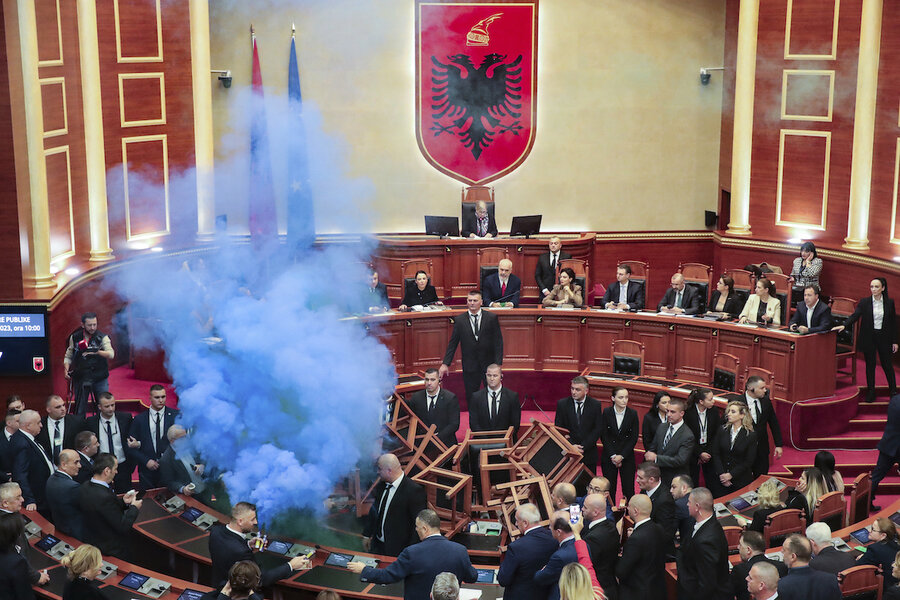Albanian Parliament votes amid flares, fires, and stacks of chairs
Loading...
| Tirana, Albania
For months, Albanian opposition parties have used flares and noise to disrupt Parliament, in protest at what they describe as the authoritarian rule of the governing Socialist Party.
On Dec. 7, lawmakers passed the annual budget and other draft laws, despite opposition claims that the left-wing Socialists have blocked the establishment of commissions to investigate allegations of government corruption.
The disturbances started in October just before prosecutors accused Sali Berisha, former prime minister and president and now the main leader of the center-right Democratic Party, of corruption over of a land-buying scheme that’s under legal investigation in the capital, Tirana.
Opposition parliamentarians regularly pile up chairs, use flares, start small fires, and even physically grab microphones when their Socialist counterparts take the floor.
The governing Socialists, led by Prime Minister Edi Rama, hold 74 of the 140 seats in Parliament, enough to pass the 2024 budget in an eight-minute vote and then close the session.
The opposition pledges to step up its fight until its right to establish investigative committees is accepted.
The disruption in Parliament may be an obstacle to much-needed reforms at a time when the European Union has agreed to start the process of harmonizing Albanian laws with those of the EU. Last year, the bloc agreed to launch membership negotiations with Albania and North Macedonia. After 18 months of vetting, Brussels said Albania is ready to take the next step and begin negotiating specific chapters.
Albania has been a member of NATO since 2009.
Why is the opposition protesting?
The opposition is protesting the use of Public Private Partnership projects, or PPP, launched by Mr. Rama’s Cabinet. Because the government lacks funds of its own, it puts capital projects out to tender by private companies, who then receive an annual fee for several years.
The opposition claims the public money from the PPPs has been misused for personal profit, and the parliamentary investigative commissions would probe alleged cases of corruption involving Mr. Rama and other top government officials.
In September, a former Albanian environment minister was convicted and imprisoned, along with other officials, for bribery over a contract to build an incinerator.
A former Socialist deputy prime minister left the country after being accused of corruption in a case linked to another incinerator. A former Socialist health minister has also been accused of corruption over a PPP contract worth $108 million for a lab to sterilize and distribute medical equipment.
The government says the opposition’s requests are unconstitutional, following a ruling from the Constitutional Court that a parliamentary commission cannot be set up while the judiciary is dealing with a case.
Protests yield no results for a divided opposition
After 10 years in opposition, the center-right Democratic Party is weakened and fractured, with the main grouping led by Mr. Berisha, the longest-serving politician in post-communist Albania.
In May 2021 Mr. Berisha and his family members were barred by the United States from entering the country, and later also the United Kingdom, because of their alleged involvement in corruption.
Prime Minister Rama says Mr. Berisha is exploiting what remains of the once-dominant Democratic Party for his personal profit in the legal battle.
While previously he could gather thousands of supporters at rallies, Mr. Berisha is now limited to disrupting sessions of Parliament.
Any solution in sight?
Opposition lawmakers have pledged to step up their protests, without explaining how.
Mr. Berisha has called for “civil disobedience,” but so far only Parliament has been disrupted. Calls for rallies have failed to turn into reality.
For their part, the governing Socialists are trying to work as normal, noting that Parliament has approved the largest budget ever, twice the size of 2013 when the Democrats left power.
Both sides are maintaining their stance, with no sign of sitting down to find a solution, which in post-communist Albania has often come only after intervention by international mediators.
This story was reported by The Associated Press.







